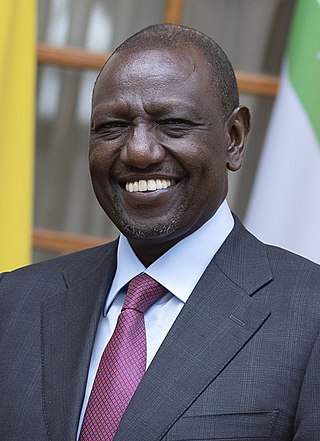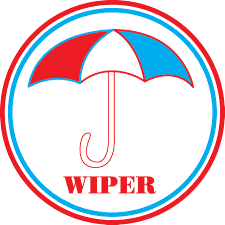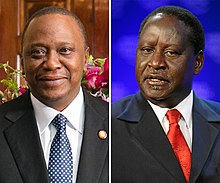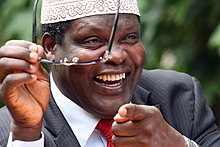
The politics of Kenya take place in a framework of a presidential representative democratic republic, whereby the president is both head of state and head of government, and of a multi-party system in accordance with a new constitution passed in 2010.

Uhuru Muigai Kenyatta is a Kenyan politician who served as the fourth president of Kenya from 2013 to 2022.

Stephen Kalonzo Musyoka is a Kenyan politician who was the tenth Vice-President of Kenya from 2008 to 2013. Musyoka served in the government under the late President Daniel arap Moi as the Secretary of Kenya African National Union party (1980-1988), Assistant Minister for Works (1986-1988), Deputy Speaker of the National Assembly (1988-1992), Minister for Foreign Affairs from 1993 until 1998, Minister of Education (1998-2001); and subsequently, under the late President Mwai Kibaki, he was Minister of Foreign Affairs again from 2003 to 2004, then Minister of the Environment from 2004 to 2005. He was an unsuccessful candidate in the 2007 presidential election, after which he was appointed vice-president by Kibaki in January 2008.

Elections in Kenya take place within the framework of a multi-party democracy and a presidential system. The President, Senate and National Assembly are directly elected by voters, with elections organised by the Independent Electoral and Boundaries Commission (IEBC).

William Kipchirchir Samoei Arap Ruto is a Kenyan politician who is the fifth and current president of Kenya since 13 September 2022. Prior to becoming president, he served as the first elected deputy president of Kenya from 2013 to 2022. Previously, holders of the position were referred to as Vice President and the officeholder was unelected and appointed by the President. He previously served in three cabinet portfolios as the Minister for Home Affairs, the Minister of Agriculture and as Minister for Higher Education.

Wycliffe Musalia Mudavadi is a Kenyan politician and land economist who is currently serving as Prime Cabinet Secretary of Kenya and expanded role of Foreign & Diaspora Affairs Minister of Kenya, he is also the party leader of the Amani National Congress (ANC), one of the founding political parties, of the Kenya Kwanza alliance. He served as the 7th Vice-President of Kenya in 2002 and Deputy Prime Minister (2008–2012), when he resigned to contest for the Presidency in the 2013 Kenyan general election and emerged third. He was the deputy party leader of the Orange Democratic Movement (ODM) (2005–2012) and Party Leader of the United Democratic Forum Party (UDF) from May 2012 to July 2015.

Raila Amolo Odinga is a Kenyan politician who served as the Prime Minister of Kenya from 2008 to 2013. He was the Member of Parliament (MP) for Langata Constituency from 1992 to 2013 and has been the Leader of Opposition in Kenya since 2013. He is the leader of Azimio la Umoja–One Kenya Coalition Party.
The Orange Democratic Movement (ODM) is a centre-left political party in Kenya. It is the successor of a grassroots people's movement that was formed during the 2005 Kenyan constitutional referendum campaign. This movement separated in August 2007 into the Orange Democratic Movement Party of Kenya and the Wiper Democratic Movement – Kenya.

The Wiper Democratic Movement–Kenya (WDM-K), formerly Orange Democratic Movement–Kenya (ODM–Kenya), is a political party in Kenya, which originated as a result of the 2005 Kenyan constitutional referendum. The party tends to be more popular among the Kamba people. It is headed by Kalonzo Musyoka, who ran for president in 2007 and served as the vice-president in the Grand Coalition of Mwai Kibaki and Raila Odinga. He is now a member of the main opposition Azimio La Umoja One Kenya Party.

General elections were held in Kenya on 4 March 2013. Voters elected the President, members of the National Assembly and newly formed Senate. They were the first elections held under the new constitution, which was approved in a 2010 referendum, and were also the first run by the new Independent Electoral and Boundaries Commission (IEBC). They coincided with the 2013 Kenyan local elections.
Smokin Wanjala is a Kenyan lawyer and a justice of the Supreme Court of Kenya. He holds a Ph.D. in law from the University of Ghent, Belgium. He also holds a Master of Laws degree from the Columbia University in the United States and a Bachelor of Laws (LLB) degree from the University of Nairobi. Wanjala lectured at the University of Nairobi for 15 years, teaching international law, international human rights law, land law and criminal law.

Miguna Miguna is an Advocate of the High Court of Kenya. He practices law as an attorney, a barrister and solicitor in Toronto, Canada. Miguna served as a senior adviser to former Kenyan Prime Minister Raila Odinga from 2009 to 2011.
The inauguration of Uhuru Kenyatta as the 4th president of Kenya took place on 9 April 2013. Kenyatta won 50.07% of the vote in the 2013 presidential election, after the supreme court dismissed the Raila petition on 30 March 2013. According to Article 141 (2) (b) of the constitution, in case the Supreme Court upholds the victory of the president-elect, the swearing in will take place on "the first Tuesday following the seventh day following the date on which the court renders a decision declaring the election to be valid." The event was held at Kasarani Stadium.A reception bouquet took place at State House,Nairobi.
The Kenya Presidential Election Petition of 2013 was an election petition aiming to declare the Kenya presidential election 2013 invalid. The Petition was filed at the Supreme Court of Kenya on 16 March 2013.

The presidency of Uhuru Kenyatta began on 9 April 2013 after being sworn in as 4th president of Kenya and ended on 13 September 2022 after handing over to William Ruto. He succeeded Mwai Kibaki. During his inaugural speech Uhuru promised economic transformation by 2030, unity among all Kenyans, free maternal care and that he would serve all Kenyans. In 2017, he won a second term on 8 August and upon a Supreme Court verdict, the results were repealed. The resulting elections were controversial as Raila Odinga boycotted the elections and as the only other active candidate, he won by a 98% victory with the lowest turn out. A stalemate would result as Raila and His partners would carry out a parallel swearing in ceremony after Kenyatta's swearing in. Riots would break out as Raila entered the country resulting in a number of deaths. On 28 March the two partnered to form the Building bridges initiative ending the tense political atmosphere present in the country.

General elections were held in Kenya on 8 August 2017 to elect the President, members of the National Assembly and Senate. They coincided with the 2017 Kenyan local elections which elected Governors and representatives in the devolved governments.
Roselyn Kwamboka Akombe is a Kenyan former commissioner of the Independent Electoral and Boundaries Commission (IEBC) of Kenya.

General elections were held in Kenya on Tuesday, 9 August 2022. Voters elected the president, governors, senators, members of the National Assembly, and members of county assemblies.

The Building Bridges Initiative (BBI) was a proposed set of amendments to the Constitution of Kenya initially proposed in October 2019. In the wake of the 2017 general election annulment and subsequent re-run, incumbent President Uhuru Kenyatta mandated the formation of the Presidential Taskforce on Building Bridges to Unity Advisory on 31 May 2018. The Taskforce was assigned to provide constitutional and legislative solutions in 9 broad categories:
- Lack of National Ethos
- Ethnic Antagonism and Competition
- Responsibilities and Rights
- Shared Prosperity
- Divisive Elections
- Safety and Security
- Devolution
- Corruption
- Inclusivity

Azimio la Umoja–One Kenya Coalition Party, popularly referred as Azimio la Umoja, or simply Azimio, is a Kenyan political alliance and party headed by Raila Odinga. It is composed of the Orange Democratic Movement, the Jubilee Party, NARC–Kenya, KANU, and other parties. Former president Uhuru Kenyatta is the party's patron. The alliance fielded Odinga as its presidential candidate and Martha Karua as its deputy presidential candidate in the 2022 Kenyan election, which they lost.


















